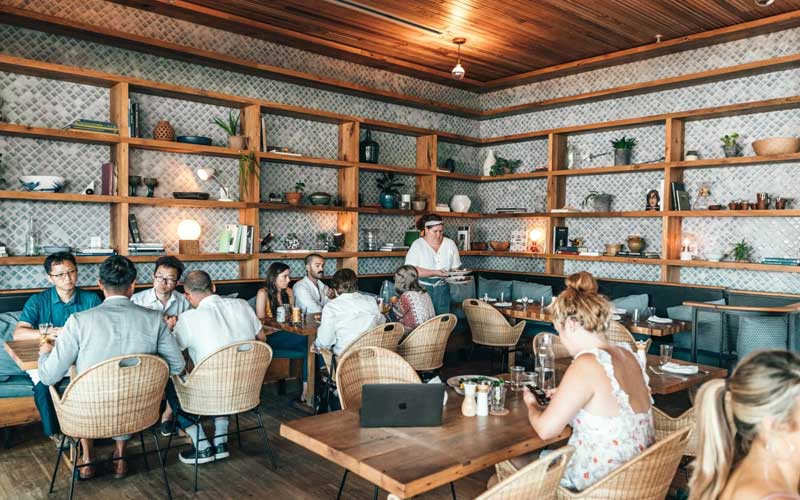
The restaurant industry moves fast. If you don’t look up every once in a while, you might just miss the latest trends in staffing and guest behaviors, or ways that other restaurateurs are increasing efficiency in their business. With the ever-evolving trends and changes to the hospitality industry, it’s become a full-time job just to manage all.
Something we are increasingly seeing in the industry among the most successful restaurants is a role that you’d traditionally see in a major corporation: director of operations. this role has popped up across the industry—everywhere from two-location restaurants to 30-plus location groups—and we were curious to find out why operations roles are so important.
That’s why we asked three masters of restaurant operations to give us some insight into:
- How restaurant directors of operations got their start in the industry
- What are the important qualities of someone in an operations role in a restaurant
- What a day-in-the-life of an operations role looks like
- Why the position is so crucial to a restaurants’ success
- What challenges are faced for someone in an operations role
Representing restaurants across the country, our operations experts provided different perspectives from restaurant groups big and small.
- Jamie Cunningham: Director of Operations at Stay Golden in Nashville, TN.
- Colleen Simon: Chief Operating Officer at Homegrown Hospitality Group in Charleston, SC.
- Jordan Bright: Operations Manager at Food Fight Restaurant Group in Madison, WI.
This guide will walk you through the future-proof restaurant tactics that’ll add flexibility to your business—a key to thriving in the new world of hospitality.7 Ways to Run Your Restaurant Smarter
How did you get your start in the restaurant industry?
Cunningham: I started working at a coffee shop in Nashville 10 years ago. I really liked restaurants because the systems made sense to me, so I suckered my boss into giving me an opportunity. I created a position where I was overseeing education and quality for all five locations and started learning about the restaurant business, how to price out items, costs and overhead labor.
During my next job, I started learning the hard stuff like payroll, invoicing, and other day-to-day things that keep the business on track financially. Now at Stay Golden, I’m dialing in systems and operations for two locations.
Simon: I’ve worked in the restaurant industry for over 20 years. I started as a server and bartender and eventually worked my way up into management before graduating from college. From there, I joined a franchise restaurant group based out of the New York Metro area for a large corporate-casual restaurant chain. I managed daily operations there for four years before being promoted to a regional training management role, where my main focus was opening up 15 of our restaurant locations.
I was later promoted to director of personnel and development and worked alongside executive and management teams to work on training and development functions. Eventually, that led me back into an operations role as director of operations for the 20 locations we operated. After 12 years with that restaurant group, I was offered an opportunity with my current group as chief operating officer.
Bright: I was working as a bartender in college and after graduation, a management path was planned out for me at Food Fight. Now, I’m the operations manager for eight of the 20 restaurants in the group.

What qualities do you think owners and managers should look for in hiring an operations role?
Cunningham: I think there are three big things to look for. First, they have to be a self-starter. They need to be able to be given a vision or goal outside of just a job description. Often, restaurant owners aren’t really present on the floor, so they need to be able to trust someone. The second important quality is very high-level communication skills, and they also have to be very organized. There are so many moving pieces in a restaurant.
Simon: Skillset is extremely important, but it makes a big difference if someone truly understands hospitality. We see a lot of great applicants and are fortunate to work with some great leadership in our group that truly impresses this upon the teams operating our restaurants. Integrity is another quality that has made all of the difference in our success. Training someone to make the right decisions all of the time, not just when someone is looking, is something we look to do as well.
Bright: You have to have an immense amount of confidence in your knowledge base. Another important quality is knowing that every business is a relationship business. I stay focused on building relationships over time and know that nothing else matters if I don’t have that piece. The work you’re really doing is building relationships with your employees, helping them build relationships with their guests, and then making sure that your food and beverage is at a high quality.
You have to have strong financial acuity and you have to know food and beverage, but if you’re not building the relationship with your teams, if you’re not just problem solving, and using those skills, you’re not going to be super successful.
What does a typical day look like for someone in an operations role?
Cunningham: Every day is different. It’s different season-to-season and right now we’re working on building our private events business. So I have a focus on one large-scale goal, then my days differ based on the current needs of the restaurant. Often, that’s fixing major points of friction in our operations that are slowing down staff or causing negativity.
Simon: Our directors of operations are expected to operate at a high level. The position requires a multi-unit experienced individual who understands the P&L and operating within the parameters of budgets. This position is responsible for daily communication across many teams (accounting, operations, human resources, and executive management). They are ultimately responsible for ensuring that inventory and ordering is done with integrity at the store level. They interview, hire, train and manage new management. They also are involved in the local store marketing initiatives, ensuring we are operating within the parameters of safe service, of both food and alcohol. Most importantly, a director of operations should be developing the teams from within so that we can continue to grow with talented, seasoned leadership.
Bright: None of my days are typical. We really treat our operations managers as a kind of a CEO of their own group. I bounce around between eight restaurants, so I’ll be dealing with marketing for one restaurant while also trying to dial in on a labor cost issue at another restaurant. I do make sure that I actually get to work with management teams and our executive chefs every day because that’s the part that’s actually fun and rewarding.

What value do you believe operations roles bring to a restaurant?
Cunningham: I think it’s helpful for general managers to know that they have one point of contact. As a business partner and somebody who is overseeing both locations, I’m obviously highly interested in the restaurant succeeding and growing. Even in our city, East Nashville has a different market than our Sidco location. It’s so weird because they’re only two and a half miles apart, but it’s a completely different demographic. In my role, I’m able to look at both locations and strategize because I have information coming at me from both locations, and I know what each location needs.
Simon: There is a great value to having operators in multiple locations. There is a broader view and there is the ability to successfully train, coach, and develop your team and give them career paths that are available outside their own home location. The communication and sharing of best practices make this role important to the success of individual locations but ultimately, it helps to grow the business.
Bright: I’m able to identify inconsistencies across my restaurants. Routinely things come up that I have no idea how to solve, but it happens so often, pretty confident I’m going to figure out a way to solve it or find someone that can help me solve it.
What types of challenges do restaurant directors of operations face?
Cunningham: There are always big task lists. There is always all of the logistics. There are always things that need to be done. At the end of the day, I think my issues as a director of operations are the same as general managers and the same as shift leaders. People will always be our greatest asset and often our greatest burden. I don’t mean that in a bad way, but if you’re trying to take care of your people well, they work hard, you make them feel valued, their voice is heard and things like that—even in that scenario, things can go wrong.
Even when you’re working hard to do everything well and make sure you have a healthy culture, things still happen. The area where I’m spending most of my time: trying to make sure we’re doing business well and taking care of our team.
Simon: We operate eight different concepts across three states, so the challenge in keeping operations as streamlined as possible is important for us as a restaurant group. As we continue to grow and add to our workforce, it will be important to have the best technology available to us so we are able to make the best use of our time and resources.
Bright: The labor market as it sits right now is an interesting challenge. Finding and hiring talent—especially in our market—hasn’t been the easiest thing in the last two years. I think it’s challenged us to recommit to making the best work environment in the industry. There’s plenty of work to be done, but I think we’ve dedicated ourselves to finding some solutions to it and that’s paying off.

What it takes to become a restaurant director of operations
Based on the experiences of our three restaurant directors of operations, here is a summary of what it takes to make it in this position.
Restaurant director of operations job description
- Must be a self-starter
- High level of communication skills
- Extremely organized
- Passion for providing top-notch hospitality to guests
- Integrity to make the right decisions for the restaurant, staff and guests
- Confidence in your knowledge of the industry
- Problem-solving and relationship building skills
- Ability to strategize based on customer demographics
- Ability to manage multiple projects at once
- Ability to successfully train and coach a team
- Ability to identify inconsistencies across restaurants
Restaurant director of operations responsibilities
- Identify problems in the day-to-day operations and ways to fix them
- Manage day-to-day operations while also working toward long-term business goals
- Identify profits and losses and operate within the parameters of budgets
- Daily communication across many teams (accounting, operations, human resources and executive management)
- Interview, hire, train and manage new supervisors and managers
- Develop the team and provide paths for growth within the company
- Maintain company culture and staff morale
- Keep operations as streamlined as possible
- Understand key revenue drivers and identify any room for improvement
- Make decisions on how to operate the business from both a guest and financial standpoint
Looking for a technology partner to help you and your staff manage the day-to-day and streamline operations? Learn more about how Lightspeed can help.

News you care about. Tips you can use.
Everything your business needs to grow, delivered straight to your inbox.


